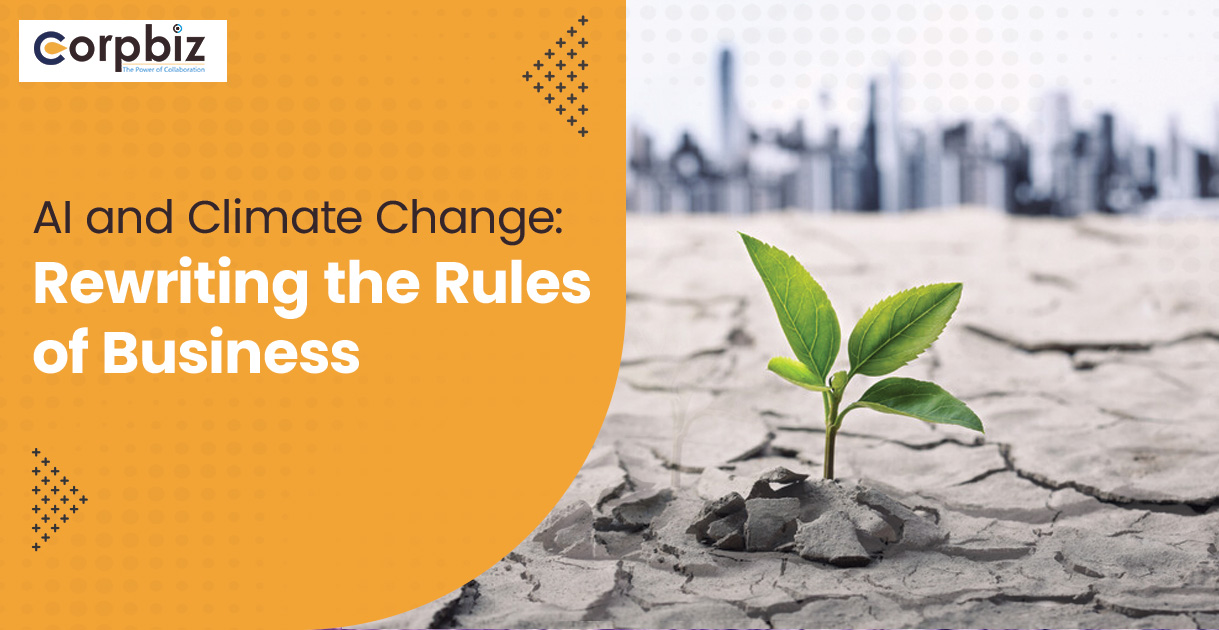AI’s relationship with climate change continues to redefine the operations of firms and industries in various ways. As the demand for efficient climate change measures grows, companies are increasingly adopting AI technologies to drive sustainable practices, optimize operations, and bring innovation. This change is not just due to regulatory forces or consumer pull; it is a structural change that defines how companies perceive themselves on the strategic map and plans for the future.
AI’s potential to handle big data, predict outcomes, and automate systems is becoming critical for organizations that seek to optimize their environmental impacts and response to changes. By cutting energy consumption and costs, smoothing supply chains, and urging product development, AI is emerging as an essential tool against climate change. AI and climate change must walk together for a sustainable future of business.
The Current Landscape: AI and Climate Change
Climate change is one of the biggest threats to the current environment, affecting firms, industries, and nations. In the Global Risks Report delivered at the WEF in Davos in 2024, several interconnected risks, including misinformation, climate change, geopolitics, and AI, are intensifying, requiring leaders to reconsider their organizations’ environment and strategies.
AI and climate change is approaching and attaining higher levels, and its rapid growth is affecting traditional norms on a large scale. Firms are also aware that incorporating AI is not just an enhancement to their operations but a necessity as the world shifts into a sustainable environment. The integration of both of these megatrends is, therefore, both a threat and an opportunity for organizations.
Application of AI in Climate Protection
AI-assisted automation is being applied in various sectors to support sustainability practices. Here are some key areas where AI is making an impact:
Energy Management
Integrating AI into energy management helps control energy consumption and reduces wastage. AI also provides an opportunity for a smart grid where energy demand can be predicted, and the supply is adjusted accordingly. For example, AI algorithms can analyze data to anticipate energy requirements and help energy companies change the time of energy utilization to off-peak hours, hence cutting down on the amount of cost and carbon emissions.
Optimizing energy use is not just about reducing costs, it’s a strategic approach that can drive your organization towards sustainable growth. However, implementing an energy management system will help your organization effectively, monitor, control and reduce energy consumption and help protect climate.
Supply chain Optimization
Supply chain management is a sensitive topic about sustainability and AI is improving efficiency in supply chain management and procurement. The data analyzed through artificial intelligence can provide the company with opportunities to reduce transport costs and find the optimal ways to manage inventory, helping to reduce the consumption of natural resources and energy. Furthermore, insights from the AI engines for supply chains can help transform economies into circular economies where materials can be utilized, recycled, and reused.
Product Innovation
AI is allowing various firms to adapt new sustainable products and services. By identifying consumer trends and environmental characteristics, companies can create innovative and sustainable products. This not only increases consumer loyalty towards the company but also creates opportunities for companies that focus on sustainability in their products.
Decision Making
Artificial intelligence has enabled businesses to make decisions based on present data analysis. This capability is vital in finding opportunities for waste minimization, trend forecasting, and structural alignment of sustainability goals. Applying AI to corporate decision-making helps increase sustainability accountability and improve the companies’ performance.
Issues Regarding Implementation of AI in Sustainability
Despite the potential of AI to drive sustainability, it faces several challenges that need to be addressed:
Energy Consumption
Energy needs are a significant concern arising from using AI setups, especially data centres. Some reports indicate that business processes linked to AI technologies cause high greenhouse gas emissions, which can challenge firms’ sustainability strategies. However, businesses must invest in energy-efficient technologies and renewable energy sources to tackle this.
Ethical and Regulatory Issues
As with any technology, ethical and regulatory problems associated with using artificial intelligence also appear. The government and corporations have to work with complicated governance frameworks so that they can achieve the efficient use of artificial intelligence while also maintaining compliance standards. The Artificial Intelligence Act, which has been advanced by the European Union, showcases how business entities must embark on efforts to integrate the appropriate level of ethics in the handling of AI strategies.
Data Privacy and Security
AI utilization requires huge amounts of data collection, which is viewed as a threat to privacy and data security. To protect sensitive data and information, organizations must implement effective measures for data protection and comply with set regulations. If they fail to do so, it can harm their public image and have legal repercussions.
Trends in AI and Climate Business
Organizations should collaborate with other organizations, governments, and non-governmental organizations (NGOs) that are significant in dealing with climate change. Programs such as the GPAI push for an international AI for Climate Partnership underscore the need for entities to come together and contribute towards the creation of efficient climate AI solutions. Collaboration can help to achieve better results and expand the sphere of sustainable development.
1. Investment in Renewable Energy
Companies are considering renewable sources of energy to minimize their effects on the environment using AI technology. By inducing renewable energy and complying with environmental objectives, companies can power their operations sustainably. This reduces emissions and provides increased energy security in a sensitive market.
Companies are increasingly turning to renewable energy sources to minimize their environmental impact and leverage AI technology to optimize this change. However, to reduce emissions and enhance energy security in a volatile market, the renewable energy business setup become a solution to help your organization adopt and manage renewable energy sources effectively.
2. AI for Climate Adaptation
AI is used to adapt to climate change. Organizations are using AI to simulate climate scenarios, evaluate relevant threats, and create plans to address the consequences of climate change. For example, weather patterns can be analyzed to predict extreme cases and help firms plan and protect their businesses.
3. Consumer Demand on Sustainability
In recent years, most consumers have become concerned about the sustainability of the environment. As a result, organizations have incorporated the issue of sustainability into their strategic plans. Through big data analysis, AI can assist in determining the most popular products and assessing the market’s interest in sustainable products and services. This trend is opening up new opportunities and acting as the basis for innovations in the market.
Strategic Approaches for Businesses
To effectively navigate the challenges and opportunities presented by AI and climate change, businesses should consider the following strategies:
1. Develop a Net-Zero Roadmap
Companies that intend to decrease their emissions must develop a detailed strategy for achieving net zero. This involves determining areas of activity that require attention, setting achievable targets, and introducing practices that align with sustainability goals. Organizations should dedicate themselves to providing sustainable goods and services to bring about change in the long run.
2. Implementation of ESG Metrics
Highlighting environmental, social, and governance metrics for evaluating businesses has become important. Rather than being perceived as separate compliance requirements, they must become part of the organization’s day-to-day processes. They must focus on low-carbon operations, green supply chains, and recycling activities, among other things.
Therefore, to help businesses to seamlessly incorporate the critical metrics into their core processes the businesses need ESG strategies to ensure sustainable growth and long-term success.
3. Taking Advantage of Advanced Technologies
Organizations should embrace technologies such as generative AI, machine learning, and the IoT to improve their sustainability initiatives. These technologies can bring a major shift from traditional supply chain management practices, enhance supply chain transparency, and raise awareness of compliance with global standards.
4. Collaboration with Stakeholders
Engaging stakeholders, employees, customers, and investors is crucial to achieving sustainability goals. Organizations should collaborate with other organizations and participate in industry programs for sustainable management.
The Future of AI and Climate Business
Over the years, greater advancement in the development of Artificial Intelligence is expected to broaden the coverage of climate action and solutions to other environmental problems. Here are some anticipated developments in the intersection of AI and climate business:
Greater Opportunity
AI will become even better equipped to predict climate risks/opportunities more accurately for companies. Better predictive modelling will help firms respond to the market to minimize risks and discover emerging trends for profit-making.
Implementation of Climate Policy
Public administration authorities will rely on AI more often to make climate policy-related decisions. By analyzing large amounts of data, AI can determine the efficiency of existing policies and what should be changed. It will improve the business industry by promoting the alignment of business activities with legal requirements and regulatory frameworks.
AI-Driven Circular Economy Models
AI technologies that help realize efficient resource use and waste reduction will help drive the shift towards the circular economy. Companies will incorporate AI technology that focuses on recycling, remanufacturing, and resource recovery in the economy to attain a more sustainable economic environment.
As the effects of climate change spread over national boundaries, there will be a greater need for international cooperation. Initiatives to advance global AI collaboration for climate action will increase momentum due to knowledge exchange and resource sharing across nations and organizations.
Conclusion
The application of Artificial Intelligence in climate change is revolutionizing different sectors and industries as it brings new risks and opportunities. While the pressure on businesses to manage climate change increases, those that integrate AI technologies productively will improve the impact of strategies in managing climate change while gaining a competitive advantage.
However, looking into the future, AI use in climate action will persevere to transform and develop new realms of progression. The businesses that adapt to this change will not only become the key solution providers to the climate change problem but also gain the competitive advantage to be the leaders of change towards sustainability.
Ready to integrate AI into your sustainability strategy? Visit our website corpbiz to drive your business towards a greener future.
Frequently Asked Questions
How can AI help businesses reduce their carbon footprint?
AI can review and identify consumption patterns in energy use. It can also help improve supply chain operations and refine product design to minimize wastage and emissions. The application of various procedures based on data analysis allows organizations to make better decisions that will suit sustainability objectives.
What are the environmental impacts of AI technologies?
The energy consumption of AI technologies, which include data centres, results in more greenhouse gas production. Companies must manage these effects by sourcing renewable energy and efficiently using energy resources.
How can businesses ensure ethical AI practices?
Organizations that employ large sources of data and AI technologies must obey data protection laws, develop specific guidelines and policies for AI usage, and act responsibly and transparently.
What role do collaborations play in AI for climate action?
Collaboration among businesses, government, and non-governmental organizations in implementing AI solutions for sustainability increases sustainability solutions’ scalability. When it comes to complex climate issues, multiple stakeholders’ resources and expertise must be combined to provide proper solutions.
How can AI contribute to a circular economy?
AI can help improve resource use, reduce consumption, and recycle, reuse, and recover used products in a circular economy framework. Implementing AI models can cut the carbon footprint and generate new sources of income for various industries.
What are the challenges of integrating AI and sustainability?
Major concerns relate to the energy demands of AI technologies, legal and social issues, privacy issues, and coordination of efforts. These are some of the issues that need to be overcome before businesses can implement AI for sustainability.
How can AI enhance climate resilience?
With the help of AI, organizations can create climate scenarios, evaluate their potential, and identify relevant threats and ways to address them. AI can also be used to forecast weather and various critical events that may disrupt business and protect it.
What is the role of AI in climate policy?
Governments are increasingly turning to AI to help guide climate policy. Using big data, AI can determine the efficiency of previous policies and even point out the shortcomings in the correlation between business activities and regulations.
How can AI contribute to sustainable product innovation?
AI helps companies develop ecologically friendly products since consumers are now turning towards sustainability. Through trend identification, consumer engagement, and environmental information, firms can develop products that will improve their image and create new opportunities in the market.
What are the emerging trends in AI and climate business?
They include improved prediction techniques, AI and circular economy approaches in business, international cooperation on AI’s role in climate change, and incorporation of ESG in business operations. These trends define the business environment in the era of climate change.
Read Our Article: Importance and Benefits of Climate Literacy in India











